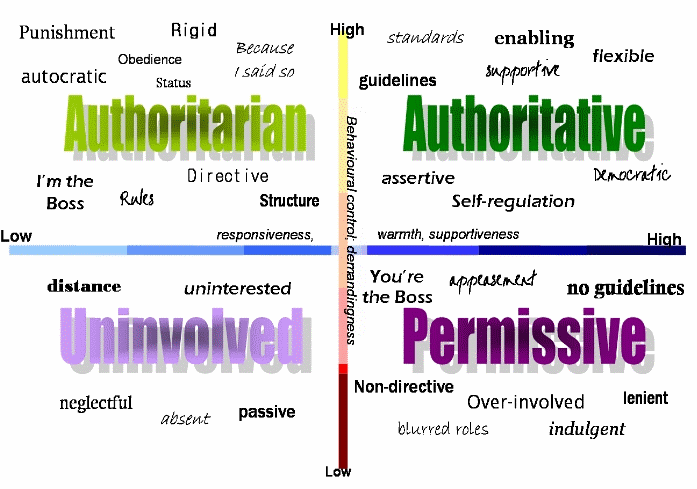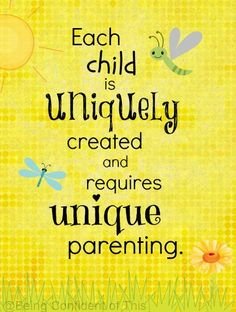Which type of parent are you?
As children begin to function more independently, conflict between parent and child may arise. Of course, parents may vary in their reactions to children's increasing demands. Psychologists have tried to identify those parenting styles that are most beneficial to children's development.

One of the most influential psychologists in this regard is Diana Baumrind who focuses on these dimensions of parenting:
- Warmth & Nurturance: Children with warm and nurturing parents are generally more securely attached than children of cold and detached parents. They generally show positive development in most areas. Parental warmth may even buffer a child against the negative effects of otherwise disadvantageous environments, such as poor and though neighborhoods.
- Consistent Control: Parents who set clear rules and consistently apply them, usually have children who are much less likely to be defiant or non-compliant. The form of control is also important. The most optimal outcomes for children occur when parents are not overly restrictive, explain things to the child and avoid the use of physical punishment.
- Expectations: Children of parents who have high expectations of them (Baumrind calls this maturity demands), also tend to fare better, specifically regarding their self-esteem and altruistic behaviors.
- Communication: Open, clear and regular communication between parent and child has been linked to positive outcomes. Listening to the child is just as important as talking to him or her. In this way, the parent communicates to the child that what he or she has to say is important. Children of such parents tend to be more emotionally and socially mature.

These dimensions of family interactions do not occur in isolation but in combination. In this regard, Baumrind identifies three parenting styles. Maccoby and Martin (1983) later added a fourth style.
- The authoritative parenting style: These parents meet the standards of all four dimensions above. It involves high acceptance and involvement, adaptive control techniques and the granting of appropriate autonomy. Parents are warm and sensitive to their children's needs, but set appropriate limits. This style is regarded as the most successful approach to child rearing and is linked to many aspects of competence throughout childhood and adolescence. These include a positive mood, self-control, task persistence, cooperativeness, social and moral maturity and favourable school performance.
- The authoritarian parenting style: This style is high in control and expectations, but low in nurturance and communication. These parents appear cold and rejecting. They frequently degrade their children by putting them down. To exert control they shout, command and criticise. If the child disobeys, they resort to force and punishment. Outcomes for these children are generally negative: they tend to be unhappy and anxious, show high rates of anger and defiance, and tend to be dependent and overwhelmed by challenging tasks.
- The permissive parenting style: These parents show warmth and nurturance, but fail as far as expectations, control and communication are concerned. Parents are generally warm and accepting, but rather than being involved, they tend to be overindulgent and inattentive. They exert little control over their children's behavior, with the result that children have to make many of their own decisions at an age when they are not yet capable of doing so. Children of permissive parents tend to be impulsive, disobedient, and rebellious. They also tend to be overly demanding and dependent on adults and show less persistence in tasks than children whose parents have more control and expectation demands.
- The uninvolved parenting style: These parents do not meet the expectations of any of the parenting styles. They tend to be emotionally detached, often because of their own overwhelming problems or because they are attracted to more exciting activities. They tend to have little time and energy left to cater to their children's needs. At this extreme, uninvolved parents often maltreat their children by means of neglect. This style disrupts virtually all aspects of development, including attachment, cognition, and emotional and social skills.

Despite general agreement on the advantages and disadvantages of parenting styles, it is equally true that the correlations between parenting styles and expected child behavior are not always strong. The expected child outcomes do not always realise and sometimes have the opposite result, for example, parents with authoritative parenting styles could have children who are rebels or are guilty of antisocial conduct. Various factors such as cultural variations, the personalities of the parents and the child, socio-economic status, and access to extended family also remind us that child-rearing practices should be understood in their broader context.

Bibliography: Child and Adolescent development, 2nd Edition, Dap Louw&Anet Louw

wow, what a good post, thanks for sharing.
Huray, see my latest post for a milestone celebration
I had a look, thanks, but my name wasn't on your list so I didn't like what I saw.

@bdmomuae aka Oprah you are in my warm heart. I reserved a place for you in my 1 Month birthday next week.
Now I feel like giving you a warm hot one...
Haha, you you made me even more fired up and read to go....
😜
yes.. that is so true..
Thank you for reading!
Hi @bdmomuae, another great article, thank you. I read the following article today that reflects some of the cultural challenges affecting parents and parenting, there are a number of interesting points in the article that you may be interested in. https://www.1843magazine.com/features/the-man-trap
I like toast 🍞
Always great to have insight from a bread winner :) But just to be sure, do you like toast?
Thanks so much, I will make sure to read it.
Are you familiar with Krishnamurti? He has some very insightful ideas on education, parenting and virtually everything for that matter.
Not at all, but I will sure find out. Thanks
I enjoyed reading through this! I always have an "idea" of how I think I parent until I read someone else's thoughts. There's always room for improvement!
Then I am happy. If it can be useful for just one person, then I've succeeded :)
Thank you for your approval;)
It's nice to connect with other parents here!
great post, quite interesting as I think I'm a mixture of styles. Just a first time mom trying her best :P